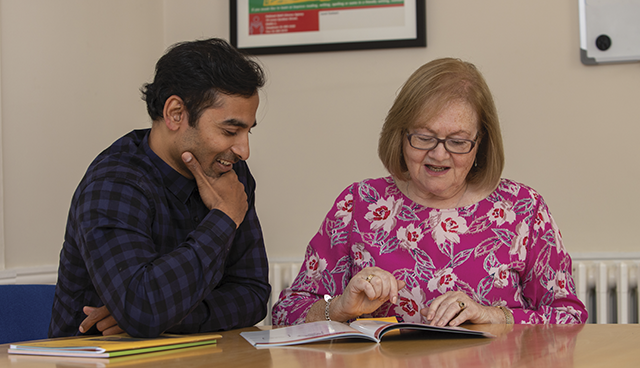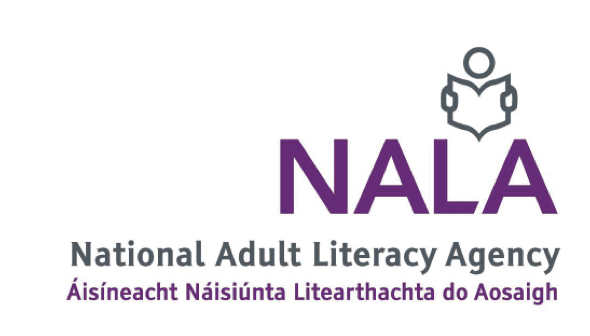Supporting adults with literacy, numeracy and digital needs

Over the last 18 months, the National Adult Literacy Agency saw a surge in calls to its freephone. They were from people who had just lost their jobs, parents who struggled with information from schools, and older people who wanted help using technology. NALA’s CEO, Colleen Dube, speaks about the critical importance of literacy, listening to callers and designing services that meet their needs.
Listening to callers
A lot of callers during the lockdown rang us as they were reflecting on their own lives. They felt very different to their friends who could work from home. When the pandemic happened and they lost their jobs, they felt their lives had come to a sudden full stop. This happened to people in all age groups. Many were also very annoyed and dejected that they were being left behind. We spent a lot of time on these calls as they needed to know someone was listening. We took the time to talk to them and discuss what options they would have if they wanted to return to education.
For some, this meant directing them to the Adult Literacy Service in their local Education and Training Board. ETBs provide a unique service that is completely free. They offer a range of learner-centred, unaccredited, and accredited courses, as well as guidance and progression to further education and training opportunities.
For others, we offered tutoring over the phone to resolve a particular issue. For example, there was a caller who had been out of work for five weeks during the pandemic. They decided they would like to do a Special Needs Assistant course but felt their spelling was holding them back, so they mightn’t be able for it. We set them up with one of our tutors who taught them over the phone for a few weeks until they had the confidence to do the course.
Sometimes it’s that small intervention that gives people the confidence and courage to go on to learn and do new things.
Pilot prison programme
This year we were involved in an inspiring literacy project with Portlaoise Prison. We did it in partnership with the Prison’s Education Unit, Laois and Offaly Education Training Board, Dublin Adult Learning Centre and Waterford Institute of Technology.
Not many people realise that over 40 per cent of incarcerated people in Ireland left school before the age of 14. As a result of educational and wider inequalities, the average literacy level of prisoners is much lower than the general population.
In this pilot programme, six incarcerated men were supported to graduate as literacy tutors and are now qualified to support other men improve their literacy.
The participants call themselves ‘The Peers’. They have normalised education and learning in the prison so now it is a good thing to have books under your arm. The positive impact of ‘The Peers’ is confirmed by teachers from the Education Unit who say that the numbers of people turning up for support has increased.
This quote sums up the project best:
“I took part in the training because I understood how difficult life could be for people without literacy skills. I discovered many prisoners wanted to write letters to their families, especially their children, and could not, due to literacy issues. I had the desire to help these people.
“People say we are doing the right thing using our time here like this, using it to be educated. Many see it as the best way to do time.”
Training online
Like many organisations we moved all our training online over the last two years, which has been a very positive experience for us. While we normally held about five events annually with 900 tutors attending, last year we organised a diverse programme of training and workshops online, supporting over 1,500 tutors’ professional development and knowledge sharing. While we hope to have some face-to-face events next year, there’s no doubt that we’ve been converted to online delivery. Literacy tutors are incredibly busy and it just suits more people not to have to travel.

“In Ireland, one-in-six people has difficulty understanding written text, so a lot of our work involves helping organisations to be more accessible to people with literacy needs. There are huge benefits and cost savings of doing this, such as fewer customer complaints and mistakes.”
Plain English
In Ireland, one-in-six people has difficulty understanding written text, so a lot of our work involves helping organisations to be more accessible to people with literacy needs. There are huge benefits and cost savings of doing this, such as fewer customer complaints and mistakes.
One step in the right direction is for organisations to use plain English and last year we trained a thousand employees in how to write in plain English. We also supported one hundred public and private sector organisations in editing their documents in plain English so that they are easier for all people, but especially people with literacy needs, to read and understand information.
There is a growing demand from the public for clear information and we recommend that anyone producing public information write it in plain English. After all, both citizens and governments benefit from clear information. Citizens are more likely to understand their rights and governments are more likely to make better use of their resources.
10-year strategy
In Ireland, the supposed land of saints and scholars, over 500,000 adults have low levels of literacy. Even more have low levels of numeracy and digital skills. This has a devastating impact on individuals, families, and communities. This year, after many years of advocating, we were heartened to see the Government’s commitment to develop a new 10-year strategy for adult literacy, numeracy and digital skills. Beyond its intrinsic importance as part of the right to education, literacy empowers individuals and improves their lives by expanding their capabilities to choose a kind of life they can value.
Now, more than ever, it will be vital that we support people with literacy needs, so that they can understand information, make constructive choices, self-advocate and ultimately respond to external pressures and change.
So, have a look around you — one-in-six people has a literacy need. They could be your customers or valued members of staff. Think about how you could support them through training or making your services more accessible.
We’re here to help in any way we can and would love to hear from you.
T: 1800 20 20 65
E: info@nala.ie
W: www.nala.ie
Twitter: @nalaireland






